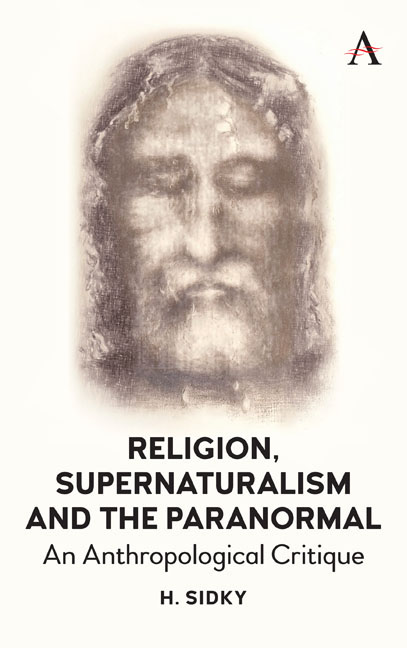Book contents
- Frontmatter
- Dedication
- Contents
- Acknowledgments
- Introduction
- Chapter One The Problem with Religion: Preliminary Issues
- Chapter Two The Unreal Real: The Supernatural, Religion, and the Paranormal
- Chapter Three Can Science Say Anything About Religion and the Supernatural?
- Chapter Four Ghostly Rappings, the Science of the Soul, and the Religious Nature of the Paranormal
- Chapter Five Ghostly Encounters in the Field: Anthropology of the Paranormal or Paranormal Anthropology?
- Chapter Six Why We Think the World Is Haunted
- Chapter Seven Cognitive Biases and Why People Think Eerie Thoughts
- Chapter Eight Miracles as Evidence of God's Actions in the World
- Chapter Nine When God Talks to People: Are Religious Experience Evidence of God?
- Chapter Ten Books Authored by God? Sacred Texts as Evidence of the Supernatural
- Chapter Eleven God's Fingerprints in the Natural World: Intelligent Design, Irreducible Complexity, and Cosmic Fine-Tuning
- Chapter Twelve The Miracles of the Bible: The Quintessential Foundations of Paranormal Beliefs in Western Culture
- Chapter Thirteen Jesus the Miracle Worker, Magician, and Sorcerer
- Chapter Fourteen Jesus's Empty Tomb, Missing Body, and Return from The Dead: Sources for the Paranormal Tale
- Chapter Fifteen The Post-Resurrection Appearances in the New Testament
- Chapter Sixteen Coping with Failed Prophesy: A Socio-Psychological Explanation for the Rise of Christianity
- Chapter Seventeen Conclusions: Why Religious and Paranormal Beliefs Persist and Their Dangers
- References
- Index
Chapter Nine - When God Talks to People: Are Religious Experience Evidence of God?
Published online by Cambridge University Press: 16 December 2019
- Frontmatter
- Dedication
- Contents
- Acknowledgments
- Introduction
- Chapter One The Problem with Religion: Preliminary Issues
- Chapter Two The Unreal Real: The Supernatural, Religion, and the Paranormal
- Chapter Three Can Science Say Anything About Religion and the Supernatural?
- Chapter Four Ghostly Rappings, the Science of the Soul, and the Religious Nature of the Paranormal
- Chapter Five Ghostly Encounters in the Field: Anthropology of the Paranormal or Paranormal Anthropology?
- Chapter Six Why We Think the World Is Haunted
- Chapter Seven Cognitive Biases and Why People Think Eerie Thoughts
- Chapter Eight Miracles as Evidence of God's Actions in the World
- Chapter Nine When God Talks to People: Are Religious Experience Evidence of God?
- Chapter Ten Books Authored by God? Sacred Texts as Evidence of the Supernatural
- Chapter Eleven God's Fingerprints in the Natural World: Intelligent Design, Irreducible Complexity, and Cosmic Fine-Tuning
- Chapter Twelve The Miracles of the Bible: The Quintessential Foundations of Paranormal Beliefs in Western Culture
- Chapter Thirteen Jesus the Miracle Worker, Magician, and Sorcerer
- Chapter Fourteen Jesus's Empty Tomb, Missing Body, and Return from The Dead: Sources for the Paranormal Tale
- Chapter Fifteen The Post-Resurrection Appearances in the New Testament
- Chapter Sixteen Coping with Failed Prophesy: A Socio-Psychological Explanation for the Rise of Christianity
- Chapter Seventeen Conclusions: Why Religious and Paranormal Beliefs Persist and Their Dangers
- References
- Index
Summary
He who is involved in ecstasies and visions, who takes dreams for reality, and his own imagination for prophecy, is a fanatical novice of great hope and promise, and will soon advance to the higher stage and kill men for the love of God.
— Voltaire, The Philosophical Dictionary (1764)Something […] revealed to a certain person, and not revealed to any other person […] is a revelation to the first person only, and hearsay to every other, and consequently they are not obliged to believe it.
— Thomas Paine, The Age of Reason (1794)If you talk to God, you are praying, if God talks to you, you have schizophrenia.
— Thomas Szasz, The Meaning of Mind (1996)One frequent claim for the existence of God is the “argument from religious experience.” The philosopher Michael Martin (1990: 154) provides a concise definition of religious experience as an event “in which one senses the immediate presence of some supernatural entity.” It is a claim to “direct, rather than inferential, knowledge of the existence of God” (Scriven 1966: 136). Many people in cultures across space and time have reported powerful, private, revelatory, visual, and auditory experiences involving contact with purported super-intelligent entities, or “Divine Others” who are believed to exist outside the spatiotemporal realm of the universe but can have observed effects upon the world. In this chapter, I shall examine the case for the existence of God and transcendental realms based on the argument from religious experience. “Religious experiences” refer to different types of perceptions and feelings, and some demarcations are necessary before we can proceed. The philosopher Graham Oppy (2018: 173– 77), for instance, considers several distinct phenomena to belong in this category.
He includes thoughts generated during religious practice undertaken under the auspices of organized religious institutions, such as meditation sessions, religious dances, festivals, initiations, sermons, and so on. He also extends the term to circumstances when people witness “miraculous” events or when they have dreams construed as messages from supernatural beings or “the beyond.” The most important category for our purposes is called visionary experiences.
- Type
- Chapter
- Information
- Religion, Supernaturalism, the Paranormal and PseudoscienceAn Anthropological Critique, pp. 201 - 238Publisher: Anthem PressPrint publication year: 2019



